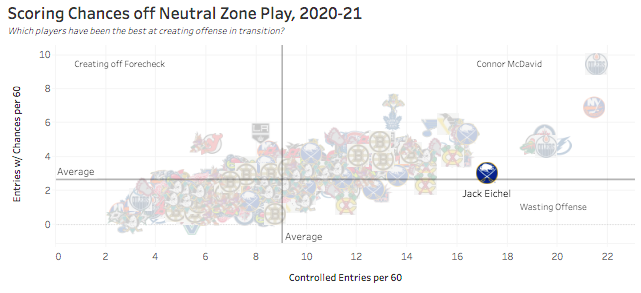For the unaware, prominent NHL insider Elliotte Friedman dropped a bombshell in the latest edition of “32 Thoughts”, reporting that the Colorado Avalanche kicked the tires on a trade for Jack Eichel, the Buffalo Sabres’ disgruntled center. For an organization looking to overcome their playoff demons, such an acquisition signifies an enormous bet on the team’s ability to convert on their open Stanley Cup window. Although trading for Eichel significantly boosts Colorado’s championship aspirations, it’s not without its pitfalls. With even consideration to the benefits and drawbacks of a potential Eichel blockbuster, let’s dive into why the Avalanche should (and should not) pursue the American-born center.
Why the Avalanche Should Trade for Eichel
First, let’s explore the reasons why an Eichel trade makes sense for the Avalanche this season. The core of the argument is based on Eichel’s status as an elite center in the NHL, a potentially unmatched one-two punch of center depth, and the future cap difficulties brought on by Nathan MacKinnon’s looming contract extension.
Eichel Is Still an Elite NHL Center
Simply put, Jack Eichel remains an elite talent, despite what his raw point totals and Buffalo’s incompetence as an organization might indicate. Since the 2018-19 season, Eichel has accumulated 178 points in 166 games, ranking 31st among all forwards. His points-per-game pace (P/G) of 1.07 puts him within the top-20 (17) and better illustrates his scoring talent. It bears reminding that points – and especially assists – are oftentimes a reflection of one’s teammates rather than their own individual abilities. A player is only attributed with an assist when his teammate scores, but what if your teammate is an atrocious finisher of chances? Hardly seems fair to place the blame on Eichel in that case.

As such, Eichel’s most common teammates at five-on-five include Sam Reinhart, Jeff Skinner, and Victor Olofsson – strong players in their own right, but not world-beaters by any means. The Sabres’ recent string of talent-barren rosters (third-fewest standings points from 2018-21) hamstrings Eichel’s productive ceiling. Given that his positional peers in Connor McDavid and Auston Matthews can count on a sidekick capable of emulating their sizeable offensive impacts (Leon Draisaitl and Mitch Marner), Eichel should not be penalized for lacking a notable running-mate through the opening stanza of his NHL career.
Eichel’s statistical profile becomes more intriguing when one considers how he might fit within the Avalanche system. Across his limited appearances in 2020-21, the center completed the eight-most controlled zone entries (maintaining possession of the puck) per-60-minutes. Although the Sabres’ lack of skilled forward depth meant that much of these entries came and went without creating a scoring chance, Colorado has no such issue.

Further, the Avalanche depended heavily on driving offense off of neutral zone transitions last season, leading the league in scoring chances coming off of the rush (2.67-per-60 at five-on-five) and choosing to skate the puck in more often than using simple dump-ins (52% of entries; fourth in the NHL). Some may see inserting Eichel into the mix as a risk, with his play style more of a homogenous addition than a diversifying option. However, more teams would benefit from leaning into their distinct identities rather than blending into the pack because of traditionally held beliefs about how a Stanley Cup champion should operate. Ask the Tampa Bay Lightning how staying the course after significant playoff capitulations paid off in the end.
Formidable One-Two Punch At the Center Position
In acquiring Eichel, Colorado allows them to roll out two of the NHL’s most dynamic centers, with MacKinnon (fourth in points-per-game among forwards since 2018-19) and Eichel (17th) both still in the midst of their primes. The majority of the league’s high-profile center tandems – save for the Edmonton Oilers’ partnership- cannot boast the same combination of skill and relative youth (both are younger than 27) that would be on display with a MacKinnon-Eichel duo.
Not only does adding Eichel elevate Colorado’s Cup odds while in the lineup, but having another top tier forward on the roster protects against unforeseen roadblocks such as injuries (such as this season’s COVID-19 debacle) or untimely suspensions (cough, Nazem Kadri, cough). No disrespect to a very capable Kadri, but if he is any team’s first-line center, they likely have the draft lottery in their sights and are not harboring any serious championship aspirations.
Related: Avalanche Analytic Takeaways – Kadri, Kuemper & More
Take last season’s playoff loss to the Vegas Golden Knights as a prime example of how the presence of Eichel could have mitigated the repercussions of Kadri’s rash decision making. Rather than having to elevate Tyson Jost or rookie Alex Newhook into a role they aren’t comfortable occupying, a second superstar acts as an additional threat for opponents to neutralize. If you’re Vegas head coach Pete DeBoer, at which line do you throw defensive ace Mark Stone? Whichever line escapes Stone likely capitalizes on a more lenient matchup, potentially the difference between another disappointing postseason exit and a championship. As MacKinnon’s upcoming contract status suggests, the clock is ticking on their Cup window.
MacKinnon’s Looming Contract Extension
Much of Colorado’s current situation can be traced back to MacKinnon signing a team-friendly contract extension after only scoring 153 points in 218 games (0.7 P/G) upon the expiry of his entry-level deal. After inking that contract, MacKinnon obliterated the projected value associated with his $6.3-million yearly salary, his P/G rate rocketing up to 1.3 in the four-year period starting with the 2017-18 season. Although the franchise watched reliable contributors in Joonas Donskoi and Brandon Saad depart for bigger contracts elsewhere during the offseason, the Avalanche retained Cale Makar and captain Gabriel Landeskog partly because of the relatively low wage packet owed to MacKinnon.

I made the comparison in a recent article projecting MacKinnon’s upcoming contract, but the Golden State Warriors’ Stephen Curry experienced similar early-career turbulence, only to explode as an MVP-level player after his team locked the superstar up to a ridiculously cheap contract in hindsight. Similarly, the cap space and surplus value provided by the Curry contract allowed the Warriors to add significant pieces around the baby-faced assassin. They famously lured former MVP Kevin Durant away from the Oklahoma City Thunder, winning back-to-back titles in 2018 and 2019. The NBA and NHL operate under vastly different cap structures and observe distinct strategies of roster construction. Still, the underlying idea remains – capitalize on the opportunity when you can because it won’t last forever.
Assuming MacKinnon makes at least $10-million per year on his next contract and Bowen Byram and Alex Newhook seek significant deals coming off of their entry-level agreements, their Stanley Cup window shrinks dramatically. Yet, the notable cap commitments to players such as an aging Kadri ($4.5-million per year), Erik Johnson ($6-million), and J.T. Compher ($3.5-million) will have expired at that point freeing up the requisite space for the approaching extensions. With Eichel still younger than 25, a trade isn’t necessarily an all-in move, as (assuming he recovers properly) the Sabres’ star will still be a player in his prime. It’s risky, and Avalanche management will hesitate to uproot their meticulous plan for contention, but flags – and Stanley Cup banners – fly forever.
Why the Avalanche Shouldn’t Trade for Eichel
Now for the pessimism. Eichel undoubtedly elevates the Avalanche in their quest for the Stanley Cup, but no move is without its drawbacks. A troubling confluence of factors primarily driven by Eichel’s uncertain physical condition, the significant assets required to pry him from Buffalo, and his significant salary underscores the rebuttal to a potential trade.
Eichel’s Uncertain Path to Recovery
Eichel last featured in a game for the Sabres on March 7, and his nagging neck injury and subsequent arguments with the organization over his preferred form of neck surgery have dragged trade talks to a halt. The primary point of consternation is the surgery, as he is reported to want a procedure that has never been performed on an NHL player, with Buffalo pushing for a more traditional operation in response. That the Sabres have occupied the league’s basement since drafting the American in 2015 does not help, and he appears to want a move to someplace where a culture of success is imminent, if not already established.

Whether Eichel gets the medical treatment he desires remains to be seen, but the recovery process associated with even the most routine procedures is fraught with uncertainty. That the damaged area is the neck adds a further element of risk, as it supports the head and is integral in staying aware in a sport as quick as hockey. Any potential setbacks may render him vulnerable or unable to replicate his previous level of play, leaving Colorado with a greatly diminished asset. Any trade talks will be underlined by the worry associated with Eichel’s return to full-strength – can general manager Joe Sakic stomach the prospect of a deal blowing up in his face?
A High Acquisition Cost
Players of Eichel’s ilk don’t grow on trees, and the Avalanche will be charged accordingly should they pursue a blockbuster deal. It’s safe to assume that the Sabres demand an enormous package consisting of at least a first-round pick, a solid contributor off of the current NHL roster, and one or two bonafide prospects. Colorado’s shrewd drafting and talent acquisition have blessed the franchise with a cornucopia of prized assets, some of which must be sacrificed in a potential deal for the disgruntled center.
Kadri and Compher are likely makeweights for salary purposes, giving Buffalo a pair of assets that they could quickly flip to another contender at the deadline and accumulate draft capital. Although the Avalanche does not have a first- or second-round pick in 2022, they still own their own selections in 2023 and 2024, meaning at least one of those four picks makes their way to the Sabres for Eichel. For a team on the cusp of a Stanley Cup, non-core players and likely lower-end first-rounders are assets that are easy to relinquish. The difficult part is considering whether the cost of losing heralded prospects ready to provide value on cheap entry-level contracts is worth it to acquire Eichel.
According to The Hockey Writers’ prospect rankings, Colorado boasts three of the NHL’s top 100 prospects in Byram (eighth), Newhook (12th), and Justin Barron (72nd). In a world where Eichel’s recovery is assured, giving up Byram or Newhook is a no-brainer given the Avalanche’s depth at their positions. The defense is set for the foreseeable future with Cale Makar, Samuel Girard, and Devon Toews. Although retaining Byram completes an embarrassingly strong quartet, it’s not necessary for a Cup run.

As Eichel only turns 25 next week, it’s not as though Newhook is being traded for an over-the-hill veteran. He likely never reaches Eichel’s All-Star-level ceiling, which gives Colorado an added boost in their Cup quest. Although it’s unlikely, the Avalanche could tempt the Sabres with other well-regarded prospects such as Shane Bowers, Alex Beaucage, and Jean-Luc Foudy also under the organization’s purview. The pieces for an enticing package exist, but whether Buffalo bites is an entirely separate discussion.
Colorado’s Current Salary Cap Crunch
Just as MacKinnon’s substantial extension carries anxieties around the team’s appearance in the aftermath, Eichel’s current $10-million cap hit brings salary cap headaches in the present. In the same blog, Elliotte Friedman also reported that a sticking point in a potential swap with the Avalanche was the Sabres’ refusal to retain salary in any Eichel trade. Colorado has opened up the season plagued by injuries, COVID protocol, and suspensions and was forced to only dress 19 skaters against the St. Louis Blues due to the resulting cap constraints.
Currently, with just over $20-thousand in cap space, the Avalanche will be hard-pressed to complete a trade for Eichel without retention without sending significant salary the other way. Andre Burakovsky ($4.9-million) would join the aforementioned targets in Kadri, Johnson, and Compher as likely trade candidates for cap relief, with the Sabres’ insistence on not retaining salary the most prominent barrier to a deal (beyond the health issues, obviously).
Where the Avalanche stand to benefit is that Eichel would not play for the team until at least 2022, giving them some time to figure out how to fit his sizeable deal on the books. Further, teams accrue cap space every day of the season, meaning that although the Avalanche are skirting the line in October, they could possess more room by March’s trade deadline. It’s a weird rule which affords them slightly more wiggle room as the year progresses, but it might come in handy nonetheless. In any case, the obvious cap gymnastics required to facilitate such a trade, given the Sabres’ disinterest in retaining salary, suggests this move is a pipe dream at this point.
An Avalanche of Questions Persist
Following through with a trade is a franchise-altering decision, and one Sakic should not make without contemplating every possible angle. On the one hand, an Avalanche attack spearheaded by MacKinnon and Eichel is as fearsome as they come, and few opponents possess the defensive bandwidth to shut down one, let alone both, of the franchise centers. However, it remains to be seen what sort of condition Eichel will be in following his inevitable surgery, and wagering a boatload of considerable assets on him maintaining his pre-injury form is a tremendous gamble. The franchise’s management group is no stranger to mega-deals, but the uncertainty around an Eichel trade is unlike anything they’ve maneuvered thus far. Which path would you choose?
